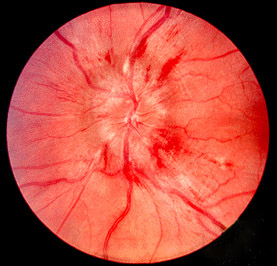Send Mr. Magoo to Mars
Posted: Tue Sep 27, 2011 4:28 pm
http://www.washingtonpost.com/national/health-science/nasa-studies-why-some-astronauts-suffer-vision-problems-during-spaceflights/2011/09/20/gIQAn9E1zK_story.html wrote:
NASA studies why some astronauts suffer vision problems during spaceflights
Washington Post: September 26, 2011
<<If NASA is ever to send astronauts to Mars, it first must solve a problem that has nothing to do with rockets or radiation.
An eye condition that has eroded the vision of some astronauts who have spent months aboard the international space station has doctors worried that future explorers could go blind by the end of long missions, such as a multi-year trip to Mars. The disorder, similar to an Earth-bound condition called papilledema, is believed to be caused by increased spinal-fluid pressure on the head and eyes due to microgravity.
NASA has asked researchers to study the issue and has put special eyeglasses on the space station to help those affected. “We are certainly treating this with a great deal of respect,” said Rich Williams, NASA’s chief health and medical officer.
According to one NASA survey of about 300 astronauts, nearly 30 percent of those who have flown on space shuttle missions — which usually lasted two weeks — and 60 percent who completed six-month shifts aboard the station reported a gradual blurring of eyesight.
For decades, NASA has heard anecdotal evidence of vision problems. But the agency began studying the issue in earnest only around 2005.
“You didn’t hear about it at all until you had one fellow come back [from space] and had problems and was very open about it. His openness led to other people reporting the same,” said Garrett Reisman, who spent three months aboard the station in 2008. Reisman had his own vision issues during a 2010 shuttle flight. “Ten days into the mission, there was a carbon dioxide spike in the cabin due to problems with the carbon dioxide filter,” he said. The next day, Reisman said, he had headaches and his vision blurred so much that he had a tough time reading the cockpit gauges. The symptoms passed within 24 hours and his vision returned to mostly normal, he said.
Much of the research so far has centered on seven astronauts who have shown symptoms, including one whose eyesight was so affected that he could “only see the Earth clearly while looking through the lower portion of his progressive reading glasses,” according to a draft of a paper to appear in the medical journal Ophthalmology.
In the months after returning to Earth, the astronaut noted a “gradual but incomplete improvement in vision,” the report said.
NASA this year flew to the station glasses that can adjust for different vision impairments.>>
http://en.wikipedia.org/wiki/Papilledema wrote:<<Papilledema (or papilloedema) is optic disc swelling that is caused by increased intracranial pressure. The swelling is usually bilateral and can occur over a period of hours to weeks. Unilateral presentation is extremely rare.
Fundal photograph showing severe papilloedema
In intracranial hypertension, papilledema most commonly occurs bilaterally. When papilledema is found on fundoscopy, further evaluation is warranted as vision loss can result if the underlying condition is not treated. Further evaluation with CT or MR of the brain and/or spine is usually performed. Unilateral papilledema can suggest orbital pathology, such as an optic nerve glioma.
Papilledema may be asymptomatic or present with headache in the early stages. However it may progress to enlargement of the blind spot, blurring of vision, visual obscurations (inability to see in a particular part of the visual field for a period of time) and ultimately total loss of vision may occur.>>

